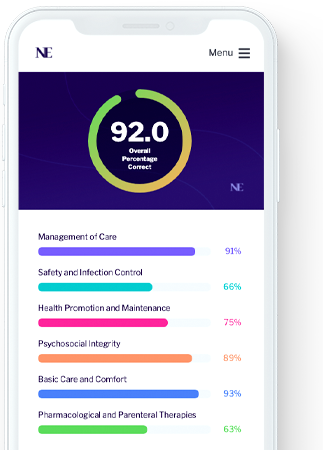What You Need to Know BEFORE Studying for the NCLEX®
The NCLEX® exam is the juggernaut that stands at the end of the road for every nursing student. In the most basic sense, a candidate who passes the NCLEX® is deemed to have proficient knowledge and ability to provide adequate nursing care as an entry-level nurse. In reality, the NCLEX® feels like the last barrier between you and the start of your nursing career. At NursingEducation.com, our goal is to take the stress out of studying for the NCLEX®. To that end, let’s review what happens if you fail—and then focus on how to increase your odds of passing the first time.
What Happens When You Fail?
Not passing the NCLEX® your first time has numerous ramifications beyond the blow to your ego and the frustration of all your hard work not paying off. Let’s discuss what you will need to deal with if you don’t pass.
1. Wait period
If you’re planning to retake the NCLEX® test a week or two after failing, you will be disappointed. At a minimum, you must wait over a month (45 days to be exact) before you can schedule a retake. You can’t just take the NCLEX®, try to memorize answers to questions you got wrong, then take the test again. The NCSBN (National Council of State Boards of Nursing) has put this policy in place to avoid cramming and to give students adequate time to address areas of deficiency.
2. Delayed start date
The 45-day wait period can create a myriad of downstream effects. If you’re like most new grads, you want to start your career as soon as possible. Given the current state of nursing, managers are extending offers to nursing students up to six months before graduation. Start dates are determined by when the NCLEX® is passed and when institutions have room for a new graduate. Failing the NCLEX® and having to wait a minimum of 45 days to retake could push back your start date for work, resulting in loss of pay, health insurance, and other benefits.
3. Retake cost
You will receive no mercy in preparing for an NCLEX® retake. Adding insult to injury, you must pay a full $200 each time you retake the test, plus an additional $75 reapplication fee.
4. Emotional toil
At the end of nursing school, the last thing you want to do is study more! After prepping for the NCLEX® and not passing, you’re back to the drawing board. The disappointment, frustration, and anger you might feel can wreak havoc on your emotions.
Scared yet? Well, you don’t need to be! Roughly 80% of NCLEX® test takers pass on their first attempt. These are favorable odds by anyone’s estimate! The goal, then, is to avoid falling into the 20% who don’t pass on their first try. Here are a few quick tips to improve your chances of success.
How to Succeed
1. Understand Yourself
Not everyone has the same abilities, especially when it comes to learning. Certain individuals learn best by reading, while others need to be more hands-on. I was most definitely not a book-smart individual. I was an equally bad test taker. This meant that I needed to prepare myself in ways that good test takers probably didn’t need to. If I had the ability of some of my classmates, who simply read their nursing books and subsequently scored well on their tests, I would have changed my game plan. In other words, know how you operate and set up a plan that will help you succeed.
2. Plan Ahead
Life seems to be at its busiest when you’re preparing for the NCLEX®. You might be moving to a new city, working, graduating, going on vacation, or any number of other things at the same time. To a certain extent, you need to plan your life in a way that gives you ample time to prepare for the test. Easier said than done! Set aside study time, schedule practice tests, and do what you need to do to ensure you pass the first time.
3. Know the Test
The NCLEX® isn’t your ordinary nursing school test. It is more complex and designed to judge your critical thinking skills. Obviously, you need a solid knowledge base of anatomy and physiology, pathophysiology, pharmacology, and the like, but you also need to learn how to take the test. Simple steps can help you eliminate certain answers. You can essentially get into the mind of the test developers to understand how they want you to answer. This insider knowledge is critical, especially if you—like me—are not the best test taker.
Walking into the NCLEX® simply hoping not to fail isn’t a good place to be and won’t lead to your best chance for success. Understanding yourself, planning ahead, and having the specific knowledge necessary for the test will give you the confidence you need to pass the NCLEX® the first time. Our goal at NursingEducation.com is your goal: for you to pass the NCLEX® and be free to start your career! Saving lives is stressful. Studying for the NCLEX® shouldn’t be.




